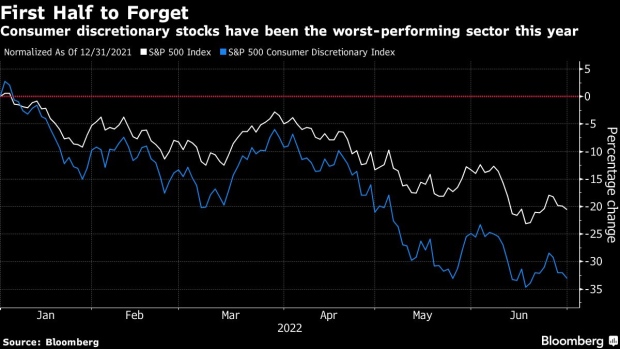Jun 30, 2022
Investors Lose $1.8 Trillion With Consumer Stocks Mired in Record Rout
, Bloomberg News

(Bloomberg) -- Investors in consumer stocks are nursing their wounds after witnessing a wipeout of $1.8 trillion in market value in the first half of the year as soaring inflation and swollen inventories crimp corporate profits.
The S&P 500 Consumer Discretionary Index has slumped 33%, set for its worst first half of the year on record in a market strained by rising costs and surging interest rates. The group is the biggest loser on the S&P 500 Index as recession concerns weigh on shoppers’ spending decisions. Adding to that wall of worry, US consumer spending fell in May for the first time this year, signaling a cooling economy that’s on weaker footing.
“As consumers continue to pull in their horns, I think that these stocks can go lower,” said Matt Maley, chief market strategist for Miller Tabak + Co.
The rout this year was laid bare in the quarterly earnings season when companies from Walmart Inc. to Target Corp. cut their annual profit forecasts. This week, RH became the latest retailer to temper investors’ expectations for the year, while Bed Bath & Beyond Inc. released a lackluster earnings report showing quarterly sales fell even more than anticipated.
Part of the problem is that stores are awash in products that consumers don’t want. At the same time, companies are grappling with surging fuel and labor expenses, and the challenge to pass on those costs to consumers.
Etsy Inc. is the biggest decliner in the consumer discretionary index so far in 2022, plunging 66% as the boost in online sales from the Covid-19 pandemic fades. Other top decliners include Bath & Body Works Inc., Caesars Entertainment Inc. and Carnival Corp.
The only stocks in the 58-member index set to notch gains for the first half of the year are Dollar Tree Inc., Dollar General Corp. and AutoZone Inc. They are up about 11%, 4% and 3% this year, respectively.
The pair of deep-discount retailers reported stronger-than-expected quarterly results last month, with consumers beginning to trade down to less expensive products. Meanwhile, AutoZone has advanced as analysts from Morgan Stanley and Goldman Sachs Group Inc. upgraded their recommendations on shares, touting the largely non-discretionary nature of auto-part sales.
In Sea of Red, Three Consumer Stocks Are Glowing Green: Chart
Despite being the worst performing group on the S&P 500, consumer discretionary stocks still aren’t cheap, trading at around 20 times projected earnings, while the benchmark has an earnings multiple of 16.
“The derating in consumer discretionary has been major, but I still don’t think it’s trading at a reasonable enough valuation to make it worth dipping your toe into that pool just yet,” Jonathan Mackay, Schroders investment strategist, said earlier this week.
©2022 Bloomberg L.P.





